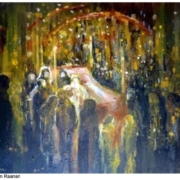The ones who come after: Vayechi
This week’s parsha is Vayechi, “He lived.” It opens, “Jacob lived seventeen years in the land of Egypt, so that the span of Jacob’s life came to one hundred and forty-seven years.” (Genesis 47:28) As with Chayyei Sarah (“The Life of Sarah”) earlier in Genesis, this parsha named after someone’s life is actually about their death, because only at the end of a life can its wholeness be measured.
Joseph brings his sons to their grandfather’s bed, and Jacob asks, “Who are they?” Maybe he doesn’t recognize them. Maybe he knows they’re related to him, but just can’t recall their names. Joseph says, “these are my sons, whom God has given me here.” I like to imagine that his voice and demeanor are gentle. It’s okay that you don’t remember; I can tell you who they are.
I learned the term “benign senescent forgetfulness” from John Jerome z”l in his book On Turning Sixty-Five: Notes from the Field. As a writer and a runner he was fascinated by the effects of aging on body and mind. Benign senescent forgetfulness is the natural tendency of the human brain to start losing track of things. It’s normal. As we age, some of what’s in our brain just… falls out.
Of course, memory loss can become disabling. I wonder how Jacob handled his inability to remember his grandsons. Did he get frustrated by the mental holes where knowledge used to be? More broadly: could he take comfort in memories of his wives and children, his travels and adventures — or did disappointments and losses take center stage as other memories slipped away?
Sometimes memory loss sparks paranoia. Because the world doesn’t feel right, and words and memories aren’t within reach, elders with dementia often lash out at their children or caregivers. That came to mind this year when I read Jacob’s parting words for each of his sons. Some of those words are loving and kind; I like reading those. But some of his words seem belligerent, even cruel.
In Jacob’s case, given what we know of his children’s lives, some of his anger may be justified. For instance, he accuses Shimon and Levi of violence. I can understand where that’s coming from, because they did make violent choices. He intimates that Reuben encroached on Jacob’s marriage bed with Bilhah, which may be supported in Torah – though some commentators disagree.
What jumps out at me is how common that accusation is. My grandfather z”l levied a similar accusation near the end of his life. (Women often accuse their children or caregivers of stealing their things.) We all knew it wasn’t true; it was dementia clouding his mind. But it’s still painful to hear words like those, especially from someone who had previously been generous of spirit.
This year I wonder: how did Jacob’s deathbed words land with his grown children? Did they find any comfort in the knowledge that some of these words might have been rooted in dementia? And is it fair to blame the curses on dementia while holding on to the blessings that accompanied them? Because some of what Jacob says at the end of his life is gentle and tender!
He compares Judah to a mighty lion; Naftali to a beautiful deer; Joseph to a colt strengthened by God. And to his grandsons Ephraim and Menashe he offers a poignant blessing, saying, “May the angel who keeps me from harm bless the ones who come after!” (That’s R. Irwin Keller‘s singable translation.) And then Jacob pleads, “In their name, may my name be recalled.” (Genesis 48:16)
You may recall that he had two names: Ya’akov, “the Heel,” and Israel, “God-wrestler.” Remembering his names means remembering the whole: the shrewd young trickster, and the patriarch changed by his wrestle with God, and all of his roles and identities in between. When we look at the whole of Jacob’s life in this way, I think it’s easier to have empathy for how his story ends.
I do think it’s okay to blame the curses on dementia while holding on to the blessings. For me, the blessings come from a true place. They come from a heart flowing with love that wants to bestow that love on the generations. The bitter words or curses come from a false place, a mind clouded by confusion. I believe that the loving words are real, and the hurtful words aren’t.
And what about us, “the ones who come after?” We’re called to compassionate memory. When we remember all of who he was, his “name is recalled in us.” Our task is to recall the choices and adventures and accomplishments of our patriarch’s lifetime. To hold with compassion the whole of his story: the beginning and middle that came before this runway toward an end.
This is the d’varling R. Rachel offered at CBI at Kabbalat Shabbat services (cross-posted to Velveteen Rabbi.) Art by Yoram Raanan.






